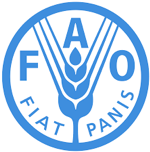About:
The Food and Agriculture Organization of the United Nations (FAO) is a specialized agency of the United Nations that leads international efforts to defeat hunger and improve nutrition and food security. Its Latin motto, fiat panis, translates to "let there be bread". Founded in October 1945, the FAO is the oldest existing agency of the U.N.
FAO is headquartered in Rome, Italy and maintains regional and field offices around the world, operating in over 130 countries. It helps governments and development agencies coordinate their activities to improve and develop agriculture, forestry, fisheries, and land and water resources. It also conducts research, provides technical assistance to projects, operates educational and training programs, and collects data on agricultural output, production, and development. Composed of 197 member states, the FAO is governed by a biennial conference representing each member country and the European Union, which elects a 49-member executive council. The Director-General, currently Qu Dongyu of China, serves as the chief administrative officer. There are various committees governing matters such as finance, programs, agriculture, and fisheries.
What we do:
1- Help eliminate hunger, food insecurity and malnutrition
In spite of progress made over the last two decades, more than 820 million people still suffer from chronic hunger. Meanwhile other forms of malnutrition are also on the rise: overweight and obesity, associated with the development of a significant surge in diet-related non-communicable diseases, affect almost four in ten adults worldwide. At the same time, more than two billion people suffer from various micronutrient deficiencies. This shows that, despite a stronger political commitment, investments and policies are not being fully effective in fighting hunger and malnutrition and are not reaching some population groups.
FAO works in partnership with governments and other development actors at global, regional and national levels to develop supportive policy and institutional environments. We help strengthen countries’ capacities to translate their political commitment into concrete action to eradicate hunger, food insecurity and malnutrition worldwide.
2- Make agriculture, forestry and fisheries more productive and sustainable
Satisfying the food and nutrition needs of an increasingly global population – projected to reach over 9 billion by 2050 –will put significant pressure on the different agricultural sectors, including crops, livestock, forestry and fisheries. Producing more with less to save natural resources, improve resilience and increase net incomes means that we need to make a clear shift away from current policies and practices towards more sustainable approaches. This transition is being mainstreamed through supporting countries to adopt a common vision for sustainable food and agriculture in support of the SDGs.
3- Reduce rural poverty
Hunger and food insecurity above all are expressions of poverty and most of the world’s poor live in rural areas. That’s why ending rural poverty is at the heart of FAO's work. Although progress has been made in reducing poverty globally, about 736 million people continue to live in extreme poverty and inequalities are still pervasive. By 2030, UN member countries have committed to eradicating extreme poverty and hunger for people everywhere. FAO is helping countries develop and implement evidence-based pro-poor policies, strategies and programmes that promote inclusive growth and sustainable livelihoods, income diversification, decent employment, access to social protection and empowerment of women and men in agriculture and in rural areas.
4- Enable inclusive and efficient agricultural and food systems
With increasing globalization, agriculture as an independent sector will cease to exist, becoming instead, just one part of an integrated value chain. The value chain exits both upstream and downstream, or from production through to processing and sales, in which the whole is now highly concentrated, integrated and globalized. This poses a huge challenge for smallholder farmers and agricultural producers in many developing countries where even the most economically valid smallholders can easily be excluded from important parts of the value chain. Increasing their participation in food and agricultural systems is critical to achieving FAO’s goal of a world without hunger.
5- Increase the resilience of livelihoods to threats and crises
Conflict, natural hazards and economic crises are driving up global hunger, causing extensive human suffering and threatening years of progress in fighting poverty, food insecurity and malnutrition. Up to 80 percent of those hit by crises are rural families who rely on agriculture for their survival. As such, FAO seeks to strengthen the resilience of agriculture-based livelihoods against multiple hazards. By bringing together humanitarian and development actions, with a deliberate focus on contributing to sustaining peace, FAO addresses the root causes of hunger while meeting the immediate needs of those affected by crisis. This involves: supporting governments and communities to prepare for, mitigate and address threats; monitoring risks and strengthening early warning systems at global, national and local levels, linking these to preventative action; actively working with communities to reduce risks and vulnerability; and providing immediate support to crisis-hit families to save lives, safeguard livelihoods and lay the foundations for more resilient futures.;
 Food and Agriculture Organization of the United Nations (FAO)
Food and Agriculture Organization of the United Nations (FAO)
